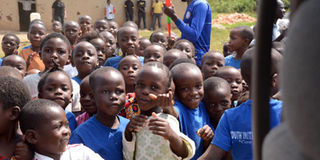Prime
Ishimwe gives hope to refugees

Some of the children Ishimwe teaches at the refugee camp. Photo/courtsey.
What you need to know:
- The first lessons were taught under a tree shade. The blackboard and the chalk that they used were donated by a nearby primary school. Ishimwe speaks of a humble start
After losing her father at a young age, Vanessa Ishimwe had to come to terms with growing up in Kyaka II refugee resettlement camp together with her mother and three siblings.
She was in and out of school because her mother could not afford school fees, which affected her academic performance.
As a refugee, she says she struggled to comprehend some topics and language barrier was the biggest problem since she had previously studied in a French education system in Rwanda.
“I sat for four years without studying,” Ishimwe says. During the years she spent at home, she searched for scholarships and she was lucky to get one for secondary education and another one for university.
At the age of 18, her experience in the refugee camp motivated her to start an early childhood development centre in order to create employment opportunity not just for herself but also other youth within the camp.
“Together with my colleagues, we noticed that there were hardly any early childhood education centres in the settlement camp yet it is a crucial stage in a child’s growth. Our idea was to educate children and create jobs for other refugee youth, she says.
According to her, starting an early childhood development centre was what she and her colleagues would do for the years she was not studying. She became an entrepreneur at a young age because she got into the company of people that were ambitious.
The first lessons were taught under a tree shade and the blackboard plus the chalk that they used were donated by a nearby primary school.
Asked how she managed to pay teachers, she says parents were asked to contribute Shs5000 for each child per term. Some refugee parents could not afford the money would work in the school garden and the crops grown would be sold to help run the school.
Under a tree shade
Seven years ago, the very first class started under a tree and a few children enrolled for school. “At this time, people started believing in what we did and our team kept growing from one volunteer teacher to more,” says Ishimwe.
Ishimwe says together with her team, she held meetings with parents, presented their plans, and sensitised them on the importance of early childhood education.
In 2014, Ishimwe says they won a partnership with UNICEF, then with Idea4africa that provided gave them an entrepreneurship training.
In 2018, Ishimwe became an Anzisha finalist, and in 2019, she won the scia impact award from the Anzisha Prize, and since then, her business idea has won her other partners such as children on the Edge Africa” and have attracted more donations and grants from other organizations including the Mastercard Foundation.

Three learning centres
Ishimwe’s initiative is currently running three learning centres which are providing free early childhood education. The centers initiated by YIDA are in Sweswe, a reception centre for refugees, Kabologota, and Itambabiniga and they also allow children from nearby communities to study.
“When the children leave the kindergarten section, they join the lower primary section which we started in 2018. We have primary one and two, but each year, we intend to add a class to ensure sustainability,” says Ishimwe.
Ishimwe attributes the success of her programme to a visionary people who she says “did not know much yet were ready to learn and volunteer.”
She says she employs refugee youths and other unemployed youth from nearby communities.
“For the teachers, we get youths who have studied at least up to O’ or A’ level, we train them for two years and they start teaching children,” she says.
Challenges
Children often face a problem of language barrier according to Ishimwe since the biggest population comes from French-speaking countries such as the Democratic Republic of Congo, Burundi and Rwanda.
Children in lower primary and kindergarten, according to the Uganda’s education system are supposed to be taught in the local language, yet refugees speak different languages.
“The language used for example in Kyaka II refugee settlement is Rutooro yet the refugees mostly speak Swahili. This makes communication and learning a bit challenging,” she says.
Children also trek long distances to reach school, they get hungry while at school and Ishimwe cannot afford to feed them. Also some classes have as many as 100 children taught by one teacher.
Despite these challenges, Ishimwe advises young entrepreneurs to focus on solving community problems.
Future prospects
She celebrates the fact that she employs more than 34 young people and is providing early childhood education to more than 700 765 children.
The Anzisha award
Twenty-four-year-old Vanessa Ishimwe is a fellow of Anzisha programme. She also won a social impact award . The programme identifies young entrepreneurs between 15 and 22 years across Africa.




